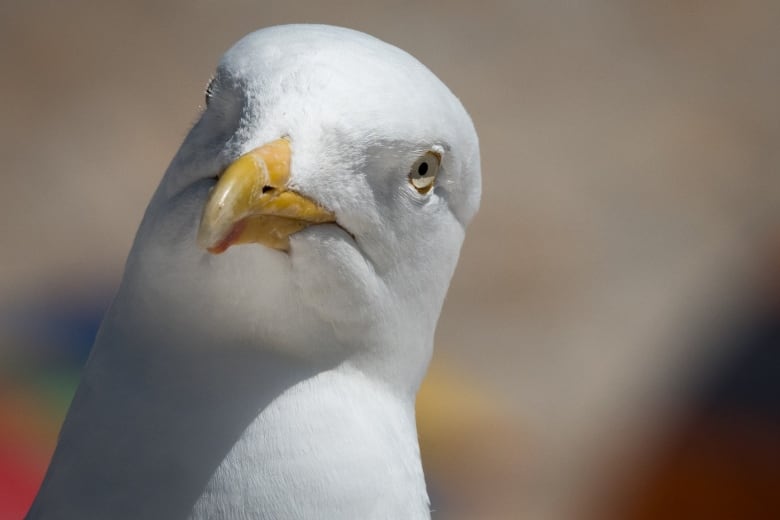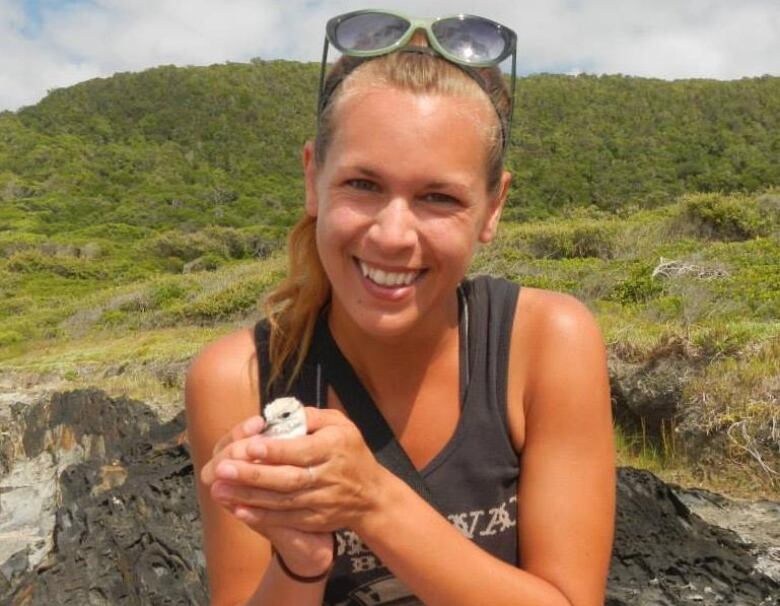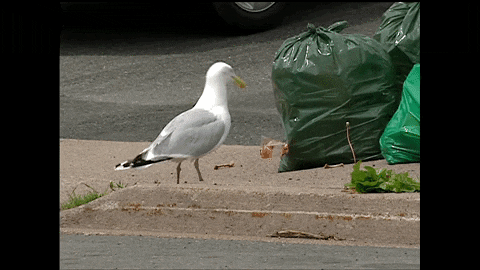Gulls make unbearable noises at ungodly hours. Here's why
Believe it or not, there's a good reason for all that noise

If you live in downtown St. John's like I do, or indeed near any body of water that attracts seagulls, you've heard the cacophonous squawking of gulls piercing through the wee hours of the morning.
And, like me, you probably shoved your head in your pillow and thought, "WHHHHY?"
After a sleepless night, I resolved to get to the bottom of the incessant cawing, and to find an explanation.
I called up three seabird biologists. Ian Jones is a biology professor and seabird specialist at Memorial University in St. John's,Cerren Richards is a master's student studying seabirds at MUN's Ocean Sciences Centre, and Selena Flores is a PhD student in Plettenberg Bay, South Africa, where she's worked among massive gull colonies with the Nature Valley Trust.
The gruesome answer: cani-gulls
I first assumed that gulls make noise during mating rituals. But Richards gave me a much more unsettling answer.
"When the gulls first hatch, the chicks start to wander around. And the neighbours next door [i.e., other gulls]will actually try to eat the other chicks," said Richards.
"Sothe parents are actually defending their chicks from their neighbours."

Cannibals! When I asked Flores, who has spent a lot of time around large gull colonies, whether she's witnessed these brutish acts of gull-on-gull cannibalism, she cheerily said, "Oh yeah! Constantly!"
Floressaid the cannibalistic attacker either chases away the parentsor waits for the parents to leave on a foraging trip so it can dig through the nest and find an easy meal.
"They definitely eat each other's chicks, all the way up to them being a couple weeks old," she said.
"And they swallow them in one gulp."
The food for the little gulls is also fair game.
"They'll even pester [the chicks] to make them regurgitate fancy scientific word for vomit their food so they can actually steal their meals," said Flores.
The noise we hear could well be a brave parent standing in the face of danger to protect its kids from being eaten alive.
The wholesome answer: gull-duation
When I brought up these callous acts to Jones, he confirmed that this does happen and could be the case, but suggested a different answer based on his observations with local colonies.

"What seems to happen this time of yearis the large chicks have started to leave their nest and fly around," said Jones.
"When they do that, it's associated with the adult birds getting very excited, and then giving these loud calls."
Jones suggested the metaphor of a graduation, where the proud adults are cheering on the younglings during their first leap into the sky.
That certainly sounds much nicer than cannibalism or vomit-stealing.
Either way you look at it, the noise we hear around this time is gulls being great parents. And, like all great parents, gulls go out of their way to do what's best for their chicks. We often see adult gulls rummaging through our trash, but when they collect food for their kids they only get the choice cuts.
"The adult gulls are not often bringing back human food to the chicks," said Flores. "They're rather going out to sea (once the chicks hatch) to feed them far more nutritious wild food like fish and squid."
Gulls can sense your fear
Working in large gull colonies can be a messy business. Gulls aren't fond of intruders, and avidly show distaste to those walking through the colony.
"They just want to nuke whatever threat is there, and they will use all the ammo they have," said Flores. "Whether it's their mouth, their rear-end, or screaming, or dive-bombing, they'll do what they can to make sure it's extremely unpleasant for you to be in their colony."

But, as Flores advises new interns, instead of cowering it's best to stand tall and assert dominance; gulls can tell when their intimidation tactics aren't working.
Flores explained that once the gulls got used to her voice, they stopped attacking and even let her near the nests.
Why are gulls everywhere?
Although all three scientists said that most seabird populations are dwindling, common gulls have adapted to thrive among humans.
After 300 years of virtually unlimited food supplemented by human discards, the local gull populations exploded, said Jones.
"Their population is perhaps 10or more times as large as it would have been before Europeans arrived on the continent," said Jones, and added that "more than 10,000 of them get their food at the Robin Hood Bay landfill."
In addition to being noisy, large populations of urban gulls can have serious negative effects on human life.
Gulls, he said, pose "an extreme problem" at St. John's International Airport, because "they constitute an air strike risk to commercial aircraft."
Jones also added that after foraging in the landfill, gulls like to bathe and defecate in Windsor Lake, potentially risking the contamination of the St. John's water supply.
Don't blame the gulls
It is easy to make gulls the villains, but all three scientists insisted the gulls are only a symptom of our own lifestyle.

Richards said part of the reason gulls rely so much on our garbage is that their natural food sources are decreasing, forcing them to eat food that is less nutritious but easier to get.
"We find them more coming to land now to find food in our garbage because they're struggling to find food out at sea a lot of the time," said Richards.
According to Jones, if we want to keep our gull populations in check we should change our own waste management practices and cover our trash.
After all, the birds are just doing what's best for their kids.












_(720p).jpg)


 OFFICIAL HD MUSIC VIDEO.jpg)
.jpg)



























































































